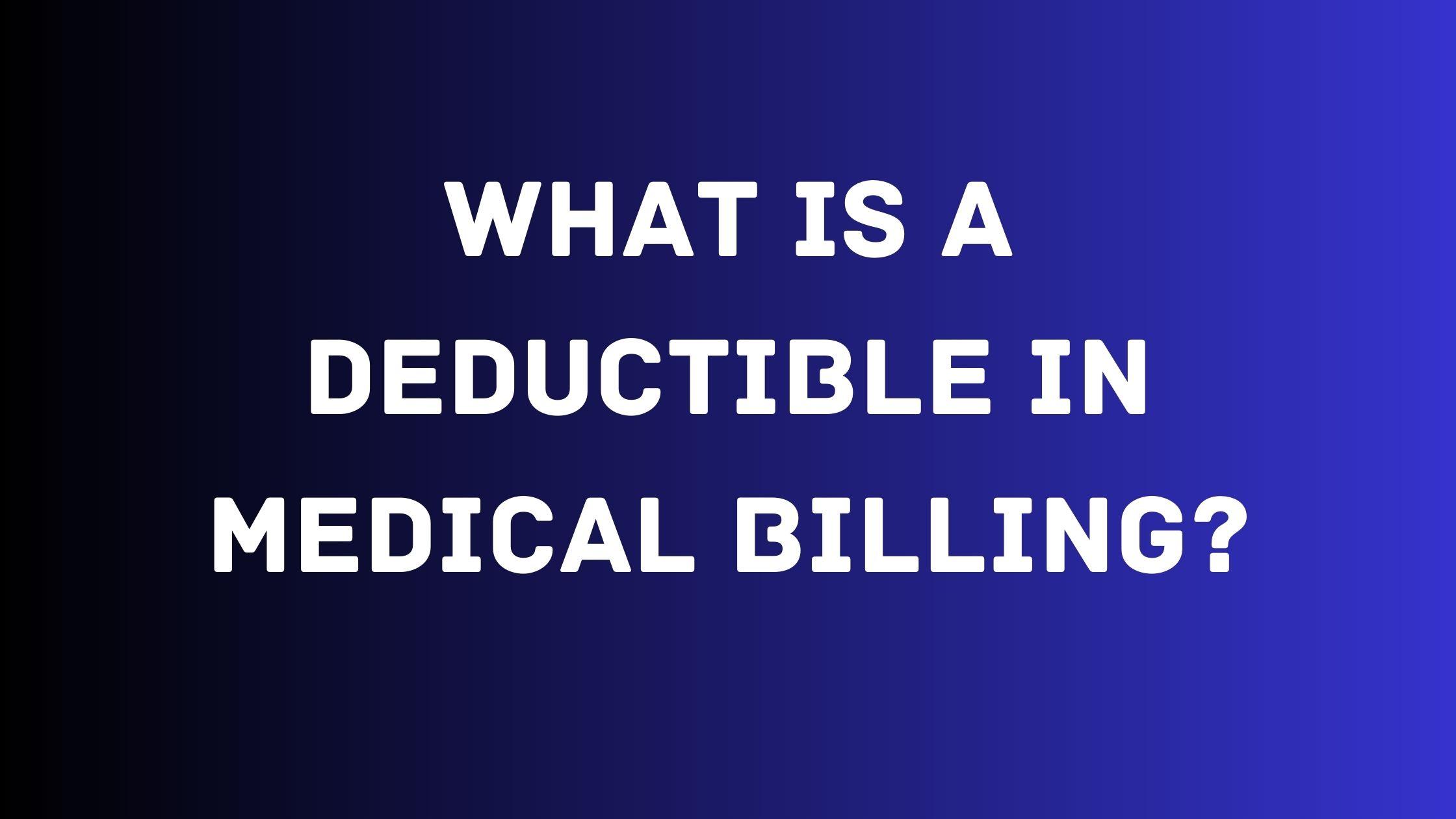Medical billing can be complicated, and understanding the various terms and processes can be daunting. One of the most important terms in medical billing is “deductible,” which can determine how much you pay out of pocket for healthcare services. In this article, we’ll explore a deductible, how it works, and what you need to know to make informed decisions about your healthcare costs.
What is a Deductible in Medical Billing?
A deductible is an amount you pay out of pocket before your health insurance plan starts covering medical services. For example, if you have a $1,000 de-ductible, you would be responsible for paying the first $1,000 of your healthcare expenses before your insurance plan starts paying for any services.
How Does a Deductible Work?
Once you’ve paid your de-ductible, your insurance plan will start paying for a portion or all of your healthcare costs, depending on your coverage. This is called “cost-sharing,” It typically involves paying a copayment or coinsurance for each healthcare service you receive.
For example, you have a $1,000 deductible and a 20% coinsurance for doctor visits. If you go to the doctor and the cost of the stay is $200, you would be responsible for paying the first $1,000 of your de-ductible and then 20% of the remaining $200 (which is $40). Your insurance plan would then pay the remaining $160.
Types of Deductibles
There are several types of deductibles that you may encounter in medical billing, including:
Individual Deductible
An individual de-ductible is paid out of pocket before your insurance plan covers your healthcare costs.
Family Deductible
A family de-ductible is an amount you pay out of pocket for your entire family before your insurance plan starts covering your healthcare costs.
Embedded Deductible
An embedded deductible is a family de-ductible that applies to each family member. Once an individual has met their de-ductible, their insurance plan will start covering their healthcare costs, even if the family deductible has not been met.
Aggregate Deductible
An aggregate deductible is a family de-ductible where all family members contribute to reaching the de-ductible. Once the family de-ductible has been met, the insurance plan will start covering the healthcare costs for all family members.
What is the Difference Between a Deductible and a Copayment?
A copayment is a fixed amount you pay for a healthcare service, regardless of the cost. For example, you may have a $20 copayment for doctor visits. On the other hand, a de-ductible is an amount you pay out of pocket before your insurance plan starts covering the cost of healthcare services.
How Does a Deductible Impact Your Healthcare Costs?
The amount of your deductible can significantly impact how much you pay for healthcare services. Plans with lower deductibles typically have higher premiums (the amount you pay for your insurance coverage), while plans with higher deductibles usually have lower premiums.
For example, let’s say you have a choice between two types of health insurance.
Plans: one has a $500 deductible and a $300 monthly premium, while the other has a $2,000 deductible and a $100 monthly premium. If you anticipate needing regular medical care, the plan with the lower de-ductible may be a better choice, as you’ll pay less out of pocket for each service. However, suppose you’re generally healthy and don’t anticipate needing much medical care. In that case, the higher de-ductible and lower premium plan may be a better choice, as you’ll save money on your monthly premiums.
What is a high deductible health plan?
A high deductible health plan (HDHP) is a type of health insurance plan with a higher de-ductible than traditional health insurance plans. A de-ductible is the amount you must pay out of pocket before your insurance starts paying for your medical expenses. With a high-de-ductible health plan, you’ll have a lower monthly premium but a higher de-ductible than traditional health insurance plans. This means you’ll be responsible for paying more out of pocket for your medical expenses before your insurance starts covering them.
How Does a High Deductible Health Plan Work?
You’ll pay a lower monthly premium with a high de-ductible health plan than a traditional health insurance plan. However, you’ll be responsible for paying a higher de-ductible before your insurance starts paying for your medical expenses. Once you’ve met your deductible, your insurance will start covering your medical expenses, but you’ll still be responsible for paying your copayments and coinsurance.
Who Can Benefit from a High Deductible Health Plan?
While a high de-ductible health plan may not be the right option for everyone, certain people can benefit from this type of plan. A high de-ductible health plan may be a good option if you’re generally healthy and don’t require much medical care. Additionally, if you have a health savings account (HSA), you can use your pre-tax dollars to pay for your medical expenses, which can help you save even more money.
Pros and Cons of a High Deductible Health Plan
Like any health insurance plan, there are pros and cons to a high deductible health plan. Here are some of the main advantages and disadvantages:
Pros
- Lower monthly premiums
- Ability to use a health savings account (HSA) to pay for medical expenses
- Preventative services are covered at 100% without having to meet the de-ductible
Cons
- Higher out-of-pocket costs
- It may not cover all medical expenses
- It may not be the best option for people who require a lot of medical care
Common FAQs about Deductibles
Here are some common questions people have about de-ductibles in medical billing, along with their answers:
Ans. No, not all health insurance plans have de-ductibles. Some plans, such as Medicaid and Medicare, have no out-of-pocket costs for covered services.
Ans. No, it is different from the out-of-pocket maximum. The out-of-pocket maximum is the most you’ll have to pay out of pocket for covered services during a given period, such as a year. Once you’ve reached the out-of-pocket maximum, your insurance plan will pay for 100% of covered benefits.
Ans. If you have a high-deductible health plan (HDHP) and a health savings account (HSA), you can use your HSA funds to pay for your de-ductible and other out-of-pocket healthcare expenses.
Ans. If you don’t meet your deductible by the end of the year, you’ll typically have to start over at the beginning of the following year. However, some plans offer rollover deductibles, which means that any amount you’ve paid toward your deductible in the current year will carry over to the following year.
Ans. Generally, no. Your deductible is set by your insurance plan, not your healthcare provider. However, you can negotiate the cost of healthcare services with your provider, which can help you save money overall.
Ans. Generally, no. Your de-ductible is set for the year and typically only changes if you switch insurance plans or make changes to your plan during open enrollment.
Conclusion :
Understanding what is a deductible is in medical billing is important in managing your healthcare costs. By knowing how deductibles work and the different types of de-ductibles available, you can make informed decisions about your healthcare coverage and choose the plan that best meets your needs. If you have questions about de-ductibles or medical billing, don’t hesitate to contact your healthcare provider or insurance company for guidance.
Related Articles:
What is Denials Management in Medical Billing?
An Overview of American Healthcare System

